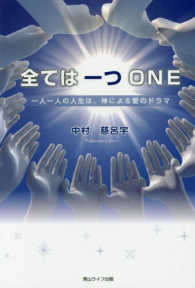- ホーム
- > 洋書
- > 英文書
- > Philosophy
Full Description
Torture is not as universally condemned as it once was. From Guantánamo and Abu Ghraib prisons to the death of Giulio Regeni, countless recent cases have shocked public opinion. But if we want to defend the human dignity that torture violates, simple indignation is not enough.
In this important book, Donatella Di Cesare provides a critical perspective on torture in all its dimensions. She seeks to capture the peculiarity of an extreme and methodical violence where the tormentor calculates and measures out pain so that he can hold off the victim's death, allowing him to continue to exercise his sovereign power. For the victim, being tortured is like experiencing his own death while he is still alive. Torture is a threat wherever the defenceless find themselves in the hands of the strong: in prisons, in migrant camps, in nursing homes, in centres for the disabled and in institutions for minors.
This impassioned book will appeal to students and scholars of philosophy and political theory as well as to anyone committed to defending human rights as universal and inviolable.
Contents
Prologue
Chapter One. The politics of torture
1. Without end? Torture in the twenty-first century
2. Torture and Power
3. The dark backdrop of sacrifice. Torture in the mechanisms of terror
4. Torture after the abolition of torture
5. The Black Phoenix
6. Torture and democracy
7. After 9/11. State of exception, pre-emptive torture
8. The debate over torture
9. The dilemma of 'getting our hands dirty'. Thomas Nagel and Michael Walzer
10. Alan Dershowitz and the 'torture warrant'
11. The lesser evil is still an evil
12. 24. The gentleman torturer
13. A political theology of torture
14. Why not torture the terrorist? The ticking time bomb
15. Dangerous, pseudo-philosophical tales
16. Illegitimacy. The torturer-state
17. A shipwreck of human rights?
18. Human dignity in torture
Chapter Two. Phenomenology of Torture
1. Defining torture. Etymological notes
2. 'Whoever has succumbed to torture can no longer feel at home in the world' - Améry
3. Torture, genocide, Holocaust
4. Killing and torturing
5. Between biopower and sovereign power
6. Anatomy of the butcher
7. Sade, the negation of the other, and the language of violence
8. From Torquemada to Scilingo. Four portraits
9. Born torturers?
10. Pedro and the Captain
11. The victim's secret
12. Saying the word 'torture'
13. On pain and suffering
14. Surviving one's own death
Chapter Three. The Administration of Torture
1. Giulio Regeni. The body of the tortured
2. Benjamin; or, on an ignominious institution
3. The G8 in Genoa
4. 'No touch' torture. On Stammheim prison
5. Desaparecidos, disappeared. When death is denied
6. The CIA's global gulag
7. Guantánamo. A camp for the new millennium
8. Abu Ghraib. The photographs of shame
9. Women and sexual violence
10. In the hands of the stronger
11. Torments and torture marked 'made in Italy'
Epilogue
References








